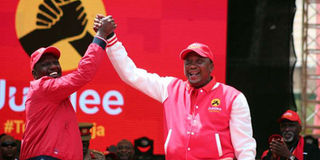New Jubilee Party brings back memories of fateful Kanu era

Deputy President William Ruto (left) and President Uhuru Kenyatta at the launch of Jubilee Party at Safaricom Stadium Kasarani in Nairobi on September 10, 2016. PHOTO | JEFF ANGOTE | NATION MEDIA GROUP
What you need to know:
- Hallmark of one-party era was complete and utter subservience under the threat of detention without trial, an extreme provision of the law that allowed the regime to jail anyone for as long as it wanted without trial.
- Anyone dissenting could also suffer humiliating marginalisation and deprivation.
Having witnessed the power and repression by the one-party Kanu rule in the 1980s, and having seen the machinations and its terrible impact in the multi-party era from 1992, I am worried by the creation of the merged Jubilee Party.
A significant proportion of our population was either not born during the one-party-state days, or were too young to know how the post-multiparty Kanu was, so a wee bit of history is called for.
Up until 1991, Kenya was either a de facto or de jure one-party state, with the only exceptions being a short period between 1963 and 1964, and then 1966 to 1969, when the opposition Kenya People’s Union was banned. The hallmark of the one-party era was complete and utter subservience under the threat of detention without trial, an extreme provision of the law that allowed the regime to jail anyone for as long as it wanted without trial. Anyone dissenting could also suffer humiliating marginalisation and deprivation.
In some instances, assassinations were used to instill fear. It is instructive that the most obvious political assassinations in Kenya’s history occurred during the one-party-state era, and included Pio Gama Pinto in 1965, Tom Mboya in 1969, JM Kariuki in 1975, and Robert Ouko in 1990. The one-party-state facilitated those in the inner sanctums to steal and engage in corruption without a care, as freedom of expression and media was highly circumscribed.
KANU AGENTS
The police acted as agents of Kanu, perpetuating impunity, while the Judiciary would seldom rule against the regime. The one-party era was one of silence and fear.
But the human spirit is unrelenting on freedom. And so, after Parliament changed the Constitution, making Kenya a de jure one-party state in 1982, dissent increased dramatically. University lecturers, including Willy Mutunga were at the forefront of this dissent. Then there was the Mwakenya underground movement, and many more. But all these efforts were cruelly put down.
The assassination of Robert Ouko, then Minister for Foreign Affairs, was a tipping point, especially since it followed the disastrous “mlolongo” voting, which the Kanu regime used to weed out those it did not like. And, finally, in 1990, Ford was formed, largely by young professionals, to press for a return to multiparty politics. The road to multipartyism was paved in blood, sweat and tears, which included the detention without trial of Ken Matiba, Raila Odinga and Charles Rubia.
But all these worked and Kenya reverted to multipartyism. Kanu, the huge monolithic party, turned from controlling its members by fear to buying them via patronage.
Thus from 1992 there was a massive explosion in corruption. This was directly linked to the need to keep politicians within Kanu’s “big tent.” The era of land grabbing ensued. Mau Forest was grabbed and allocated to private citizens; Karura Forest, Prisons’ land in Nairobi and Kitale was “given” to Kanu sycophants; Kari, ADC and other agricultural agencies’ land was “privatised”.
GOLDENBERG SCANDAL
And then there was the Goldenberg scandal, then our biggest corruption scandal ever, all meant to grease the wheels of Kanu, so people could stay in. There was Youth for Kanu '92, a lobby group that became synonymous with bribing voters for political reasons, without transparency about the source of the funds: A lot of the key people in this lobby group later became wealthy beyond belief, without a corresponding link to hard work or productivity.
This history is crucial because the only way Jubilee can keep all those claiming fidelity to it is by re-inventing Kanu post 1992. And it is already getting there as it wants to be above the Constitution and have an accountability role over public servants. But more importantly, the only way it can keep competing politicians inside the “big tent” is if it promises goodies, jobs and patronage to those who do not get nominations. Thus, yet again, parastatal and commission appointments will be given to incompetent politicians so they can remain “loyal.” We will go forward to the past.
If we think the past three years have been a corruption zone, we can expect worse if Jubilee gets into power in 2017.





